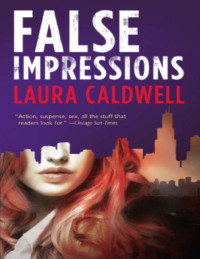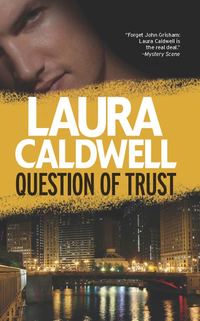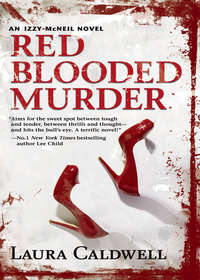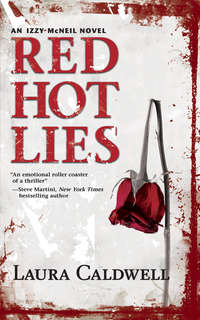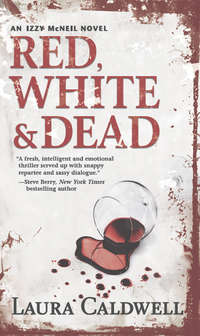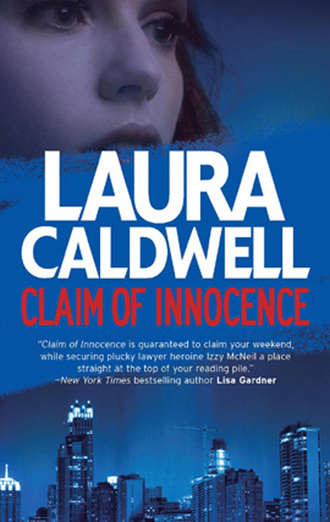
Полная версия
Claim of Innocence
“Yeah, I went to Stanford for a year,” Theo said. “I met my partner, Eric, who was a senior, and we started working on this software. By the end of that year, we were selling it. My dad helped us form the company, and we’ve been growing strong ever since.”
“Where exactly is your office, son?” Spence asked, loving anything that had to do with commercial real estate. That drew Theo and Spence into a new conversation.
We listened for a while, then my mother stood and gestured at me to follow her to the kitchen.
When we were there, she pulled me toward a counter and put her hand on my shoulder. Her blue eyes, more fair than Spence’s, were clear and striking. “I like him,” she said.
“You do? I’m glad.”
She nodded. “For many reasons. And my God, he is gorgeous.”
My mother rarely, if ever, commented on men’s looks, but I wasn’t surprised because nearly everyone mentioned Theo’s. When I’d introduced Theo to my former assistant, Q, short for Quentin, he’d commented—crudely, yes, but accurately—that every person in the room, male or female, gay or straight, young or old, wanted to fuck him. Everyone lit up for Theo, got a little red in the face, a little flustered. And the adoration only grew when people realized that he didn’t notice those reactions. Theo knew he was good-looking, sure, but he really didn’t know how good-looking. Or maybe he just didn’t like to identify with his hotness. Theo was a working guy, someone who ran his own web-design software company, and I think he liked to be connected to that more than anything.
Now, in my mom’s kitchen, I sighed a bit. “Yes, Theo is gorgeous.”
“Has your father met him yet?”
“I don’t think they need to meet.”
My mother’s eyes narrowed a little. “He is your father. And he lives in Chicago now.”
“When did you start advocating for Dad?”
My mom looked pensive, but her thoughtfulness appeared to have some curiosity about it, as if she were looking inside herself and interested in what she found there. This was different from how she usually did things; usually she shut down, became depressed and we all tiptoed around her.
In the living room we heard Charlie guffaw and Theo saying, “Exactly, dude,” laughing with him. A good sound.
“Your father deserves your respect,” she said.
“Does he?”
She looked at me, her blue eyes slicing into mine. “Yes.” A slight bob of her head. “And you should make some attempt to give him that.”
I’d seen my dad occasionally, but it was always awkward. More than awkward. For most of my life, he wasn’t around. We had believed him dead, when in truth he’d been working undercover for years. When I’d first seen him again, it was shocking. I was hunted by a faction of the Italian mob that my father had worked most of his life to shut down. As far as I knew, those particular dangers were gone now. But then again I knew that only because my father had told me so. The truth was, I didn’t entirely trust my father. Mostly, we made small talk, as if we weren’t ready to go into the big things yet. Lately, I’d avoided him. I didn’t know where to place him in my life, in my emotions. Avoidance was unlike me, but it had seemed the only workable option as of late.
“I’ll ask again,” I said to my mom, “when did you start being his advocate?”
The air was prickly as we stared at each other. We were in a minor spar, new territory.
A rueful smile came to my mother’s face, accompanied by—what was it?—a look of contentment, it seemed. It was that contentment, more than her smile or our spat that shook me somewhat. So unlike her, I thought.
“Do you know what it’s like to lose your sense of intuition?” my mom asked. Without waiting for my answer, she shook her head. “No, you have always been so good at following your gut instincts.”
“That’s not true. Last year, when Sam disappeared, I had no idea if my gut instincts were right or wrong. I was confused all the time.” I let myself feel the grief of that situation again, the whallop of confusion that had hit me over and over.
“But ultimately you followed your intuition,” my mom said. “Your intuition told you Sam was a good man and he had a reason for doing what he did. And you were right.”
“I still lost him.” But now he might be back.…
“I know how hard it’s been.” She gave me a sad face. “Really, Isabel, I’m sorry. I shouldn’t have brought this up. This isn’t the time for that conversation.”
In the other room, Charlie said something about preseason football, followed by the sound of a TV being turned on. My mother shook her head a little. Spence had insisted that they put a TV in the living room. It was hidden behind a painting that would slide away, but my mother still firmly believed TVs had no place in a formal living room. Spence had won.
“What conversation are you talking about?” I asked.
An exhale. “Well, I was just going to say that what I’ve learned lately, or maybe what I’ve decided—” she paused, seemed to be regrouping her thoughts “—is that someone can have a gut instinct and struggle with it, just as you did when Sam disappeared. That wasn’t easy, but you were smart enough to think of all the options, to play them out, and ultimately you stuck with your intuition.”
I thought about it. “Okay.” I searched for my intuition about Sam now and found my head empty.
“When your father died so many years ago, I lost that ability. I knew he was alive. I knew it in my soul. But every thing told me I was wrong. And so I had to shut down that instinct. Because he was dead. Because I buried him. Or so I thought.”
Her blue eyes shone bright against the white backdrop of her skin, more animated than I’d seen in years. Maybe ever.
“Over the years I would see him occasionally,” she said.
“What do you mean?”
“Here and there, in a crowded street or a busy restaurant, I’d see him like a ghost. And I convinced myself that that’s what it was—a ghost. I really came to believe in those things—spirits and such—because there was no other explanation.” She gave a brittle laugh. “And because I kept doing that—closing down my instinct—I ended up shutting it down in other areas of my life, too.”
I said nothing. I was mesmerized by getting behind the curtain of my mother’s mind.
“I drifted wherever life took me,” she said, “rarely making decisions, rarely thinking I had any control or any part in this.” She waved her hand around her kitchen.
“But you ultimately ended up somewhere you wanted to be, with Spence.”
She nodded, gave a little smile. “You’re right about that.”
Just then Spence came in the room. “Need anything, ladies?”
Classic Spence—always trying to help out, always catering to my mother. And yet when I looked closer, there was something not so classic. I saw he had a nervous edge to him I’d never witnessed.
My mother walked to him and kissed him tenderly on the cheek. She touched his face. “We’re fine.”
“You’re sure?”
“I’m fine,” she said. “Fine.”
Spence didn’t look like he believed her. I wasn’t sure I did, either.
Spence made a face I couldn’t read and left the kitchen.
When he was gone, I looked at my mom. “What’s going on?”
“I’m not entirely sure.”
“What does your gut instinct tell you?”
My mother laughed, and it was a beautiful sound. But she didn’t answer.
14
S omeone was in her house. Valerie Solara knew it as soon as she stepped through the front door, her arms around a brown grocery sack of baking supplies.
It had made her feel normal, going to the store. She’d decided to make a torta de chocolate, the Mexican dessert her father had taught her. It would be a treat for Layla, and baking the torta would make her feel normal, too. She wasn’t exactly sure what had given her the motivation to bake for the first time in at least a year, but she knew it had something to do with the new lawyer. Izzy, her name was.
At first, when Maggie had told her she wasn’t sure if Martin would be back, terror had flooded in. Martin was one of the few men that Valerie had ever trusted in her life, and once the feeling of terror had covered her, it was hard to see or hear around it. Technically, her eyes watched Izzy sparring with a state’s attorney about some objection. But the image of Izzy’s white suit, her red hair—all that was far away, as if seen through a telescope. The sound was muted, like it was in the next room.
But then Izzy—so charged up and cheerful—had started verbally tussling with a juror, a muscled man in a baseball cap that read Semper Fi, and she was distracted away from her panic. Izzy had won, the man was dismissed, and Valerie felt oddly optimistic. Later, Izzy talked to her, really talked to her, suggesting they meet outside the courtroom. And just like that a bolt of something—air? space?—had come in. The optimism flamed.
But now this feeling. The front door opened into a hallway and she moved down it, listening, hearing nothing. She stepped into the small living room, walked past the stairs that led up to the bedrooms and entered the small kitchen. Again she felt it—that sense that someone was there or had been there.
“Layla?” she called loudly into the still of the room.
“Yeah?” she heard her daughter’s faraway reply from upstairs.
She felt relieved. “Nothing,” she called back.
She expected the feeling to go away then, but instead it returned.
She put the bag on the linoleum counter and looked around. Everything seemed fine, the same as she’d left it—the ugly brown linoleum countertops, the old, yellow fridge—but then she saw it; a black crack running alongside the bottom of the back door.
The door was open, she realized. As if someone had just left. She felt her mouth form an O. Startled and wordless, she made her feet move toward the door. That door was always locked, something Valerie insisted upon, because it led to an alley behind the apartment, a squalid, unlit space where a person could easily hide behind the electric posts or in darkened doorways. The alley had spooked her since they’d moved in, so much so that she’d forbidden Layla to go out there. It was always Valerie who took the garbage to the Dumpster and hurried back into the kitchen.
Yet the door was open. There was no doubt about it. Quickly, she moved to it and opened it farther, ignoring her fear, and looked out at the alley. As usual, she could see little and so she slammed the door shut.
Should she call the cops? But that was the last thing she needed during a murder trial—more problems with the police.
She turned her head. “Layla!” she yelled again.
“Yeah, Mom?” She could tell Layla was at the top of the stairs, closer now.
“Did you go outside in the alley?” she asked, not needing to yell any longer.
“No.”
“Was someone here?”
Silence. Then, “No.”
Valerie locked the dead bolt. She yanked at the door once, then again to make sure it was locked.
She turned back to the horrid kitchen, so different from the one she had when Brian was alive. She looked at the sack of baking supplies, hoping, somehow, they would calm her. She thought of Izzy. But nothing could soothe her. The panic, the nerves, the questions; they were all there to stay.
15
I should be embarrassed to say this—I should, I know this—but I was thinking about Sam that night as Theo moved inside me. I didn’t like myself for those thoughts, but I let them take me over. I saw the hallway light glinting off Sam’s blond head, felt his shorter, muscled legs connecting with mine, each time.
“Set me up with one of Theo’s friends,” Lucy said. Her blue eyes were wide and excited. It was early in the morning, but Nookies, the diner where we’d met, was already open.
Lucy DeSanto and I had planned this breakfast date a month ago. Originally, we’d planned to be there at nine, after her kids were gone for the day. When I’d texted her to say I couldn’t meet because of the trial, she quickly offered to meet me beforehand, promising to be quick. I could tell she needed to talk to me about something. But I hadn’t expected this.
“Set you up with Theo’s friends?” I said incredulously. “But you’re in love with Mayburn.”
“I know.” The excitement disappeared, a crease appearing on the usually smooth skin between her eyes. “But I don’t want to roll into another relationship.” She looked out the window. Across Wells Street, people left their brick three flats and headed for the bus, en route to work.
Lucy and John Mayburn, the private investigator I sometimes worked for, had fallen for each other when he’d been hired to conduct surveillance on her husband, Michael. At first, it was a crush on Mayburn’s part, spent from afar. But when Michael was charged with money laundering and sent to a federal prison, Mayburn and Lucy had met and begun to date. Then Michael got out on bail, causing Lucy to feel she should give their relationship another shot, both for her and her kids. That shot had failed, and recently, Michael was returned to prison when new evidence was received, and he was charged with additional crimes. Lucy and Michael’s relationship was finally over and it had seemed a happy ending was in store for Mayburn and Lucy.
The other happy ending was Lucy and me. When Mayburn was watching her husband, he had asked me to befriend her as part of the case, but we really did become friends.
“Here’s the thing,” Lucy said. “I think I love John, but I can’t just move from a ten-year marriage right into another serious relationship.”
I didn’t say that I understood, that I had wondered if it was wise for me to have moved from something with Sam right into something with Theo, something that felt very real. I didn’t mention Sam’s offer to return to my life. I felt reluctant to discuss it at length with anyone before I really knew why it was happening or how I felt about it. I’d expected him to call or text me after I’d stalked out of the restaurant the night before. But so far my phone, and Sam, had been silent.
“You know John wants a serious relationship,” Lucy said.
I nodded. “He wants to be a stepdad to your kids. A very involved one.”
That desire of Mayburn’s was unlike what I had known of him before. I’d met him when I worked at the law firm of Baltimore & Brown, which often hired him to conduct private investigations—digging up info on corporations or plaintiffs who found themselves opposing our clients. When Sam disappeared, I’d turned to Mayburn for help. When he was too expensive he’d proposed a tit-for-tat relationship. I would work for him when he needed a woman to conduct surveillance work a man simply couldn’t do.
When I said yes to his offer, I assumed Mayburn was a straightforward, by-the-books investigator. He had nondescript looks—brown hair, brown eyes, medium build, a forty-year-old face that looked younger. Mayburn had always said that those vague looks had helped him in his line of work, helped him to stay under the radar. As we worked more closely together, I discovered Mayburn was a sarcastic, Aston-Martin–driving renegade. But now we were friends, and I realized that at his core, he was a softie. At least when it came to Lucy DeSanto.
“John would be a great stepdad,” Lucy said, “but I can’t do that to the kids. Michael is the only dad they know. I can’t push another man into their life right when their father has been yanked out.”
“So why would you want to date one of Theo’s friends?”
“That’s exactly it—I don’t want to date! So don’t even fix me up exactly, just take me out with a bunch of young guys who want to drink and flirt.”
“You want to drink and flirt?”
“Yes. I don’t want to be part of a couple. I’ve been part of a couple for more than a decade.” She nodded at me pointedly. “I want to do what you’re doing.”
“What am I doing? Is it embarrassing that I’m dating someone younger than me and so different than me?” Should I go back to Sam?
Lucy shook her head fast. “No, I think it’s exciting and fun. And that’s what I want.” Her eyes dropped. “Because my life is not going to be fun and exciting for a while. I’m going to have to divorce Michael, then deal with the kids while he’s in jail waiting for a trial, and then help them deal with the outcome of the trial, and then I’m going to have to decide if I stay in Chicago.”
“But Mayburn is here.”
“I know.” A sad cast appeared on her face. “And that’s why I can’t get too deeply involved with him right now. I’m not ready and I don’t know when or if I will be.” She blinked, as if batting away tears. She cleared her throat, then her eyes focused on mine. “Can I ask you a legal question? How long will it take until Michael’s case goes to trial?”
“A federal indictment having to do with organized crime? That’s a biggie. It could take a year or two, easy.”
The sad cast returned.
“Hey,” I said, “did you ever learn what evidence sent Michael back to prison?”
She shook her head. “Since I’ve told him I want a divorce, he doesn’t tell me anything. All I know is that the feds received some kind of anonymous information that linked him to that group from Italy who were trying to establish themselves in the U.S.”
“The Camorra.”
“Yeah.” She ran her fingers across her forehead, as if trying to rub away some thought. “I still can’t believe that the man I married got involved with any of that. It’s so hard to wrap my head around, and I don’t know what to say to the kids….”
I didn’t know what to say, either. The Camorra was the group my father had spent much of his life trying to shut down. It was what had taken him away from us. But Lucy didn’t know all that.
Lucy looked at me. “Don’t you see why I want to go out with Theo’s friends? I want to be with people who are younger. I want to go backward.”
Was that what I was doing with Theo? A better question—was that what I’d be doing with Sam? Going backward?
“Theo and I are supposed to go out tomorrow night with his friends,” I said. “But I have to warn you—a couple of them aren’t the brightest tools in the shed. Once I saw one of them wearing a T-shirt that said, Things are smaller than they appear.” I threw my hands up. “What does that mean? That his penis is smaller than it seems?”
Lucy laughed. “Was he cute?”
I nodded grudgingly.
“Great! This is exactly what I want. Cute, young and not-so-smart.”
I shrugged. “Tomorrow night at nine.”
16
W hen I got to the courtroom, Maggie was raring to go. I could see that even through the Plexiglas wall. Her cheeks were tinged pink, the way they got when she was excited.
I pushed open the door with the lock and walked to our table. “You’re ready?”
“Oh, yeah.” She grinned.
“You look a little revved up.”
“I found out Bernard is coming into town next week to sub with the orchestra.” Maggie actually clapped her hands.
Maggie and I met Bernard in Italy in June. He was a French horn player with the Seattle Symphony. And he was also a huge, huge Filipino guy, which was sort of funny when you paired him with little, golden-haired Maggie. But they had become a couple, despite their odd appearance together. The minute we’d returned to the U.S., she was on the phone with him a few times a day, emailing about ten times a day and texting even more.
“That’s fantastic!” I said.
“I know. My grandfather is going to flip. He loves the CSO.”
She went quiet. We both thought of Martin.
“Where is he?” I asked.
The grin fled her face. “I went to his house this morning, and he’s not doing well. He’s just kind of…fading. I don’t know how else to put it.”
“Your grandmother must be worried.”
“She is. I am, too, but I told him we could handle the openings and the first witnesses.”
“We can.” I wanted to keep up her spirits, so I changed the topic and told her I’d seen Sam after court yesterday and how I’d stormed from the restaurant.
“Interesting,” Maggie said. “But that doesn’t really help you figure anything out, does it?”
I gave her an irritated look. “No.” I changed the topic again. “Who’s handling our exhibits and graphics?”
Now Maggie gave me an annoyed glance. “What do you mean? I’m handling the exhibits. Or we are now. And we don’t have any graphics. I’ve got some blowups of a couple photos, but nothing else.”
“Holy mother of Elvis.”
Maggie looked even more annoyed. “You know, that stop-swearing thing of yours has got to go. Those curse word replacements are ludicrous, and you always end up swearing anyway to explain it. Just say it.”
“Fine. Holy shit, are you serious?” When I was at Baltimore & Brown, if I was on trial, I not only had my assistant, Q, to handle the exhibits and the graphics, I usually had command of one or two paralegals, as well.
“Yeah, I’m serious,” Maggie said.
“Do you have records from this case scanned into your computer?”
“Yeah.”
“Any exhibits in your laptop?”
“Yeah.”
“Then you should be putting them on a screen or on the wall. Everyone is used to looking at a TV or a computer. They can’t just listen anymore. You’ve got to show the jurors something.”
Maggie chewed her lip. “I know one of the attorneys in my office has the equipment for all that, but he’s a personal injury lawyer. We never use that kind of stuff.”
I shook my head. “You criminal lawyers are so weird.” I took my cell phone out of my bag. “I’ll call Q to do it.”
She shook her head. “No, no. I just brought you in on this case. I can’t add anyone else. It will throw me off. Plus, we’re in a small courtroom, and there aren’t many exhibits needed right now.”
I sighed. “Keep it in mind.”
“Done.”
I looked around the courtroom again and saw more people filing into the gallery. “Where are Amanda’s family members?”
Maggie jutted her chin toward the right side of the spectator benches. “That’s the husband, Zavy.”
I followed her gaze. I saw a handsome man, midfortyish, I guessed, but he looked younger. He wore a navy blazer over a white shirt. His hair was blond-brown and thick. His face bore slight creases around the eyes and mouth, but he was a type of man on whom facial lines looked handsome. From what I could see, he was in shape, probably a weekend athlete. If Valerie had wanted him for her own, I supposed I could understand why.
As I looked at him, Zavy raised his head and gazed through the glass to the front of the courtroom. He stared at the state attorneys’ table, at the lawyers there. It seemed to me as if he was waiting for them to glance at him, to give him some direction or ask him questions. He looked sad, helpless.
“Shouldn’t he sit at the counsel’s table?” I asked Maggie.
She shook her head.
“But he’s the victim of the crime.” I saw the look Maggie shot me. “Alleged crime.”
“He’s the victim’s spouse, not the victim,” Maggie said. “And even if he were the victim, he’s not a party to the lawsuit. The state is. Technically, the case has nothing to do with him.”
In a civil trial, Zavy would be sitting with the attorneys. He would be an integral part of the case. I felt a wave of pity for the guy. His wife had died and yet the case didn’t have anything to do with him? “I’m going to say hello and introduce myself.”
Maggie looked startled. “Why?”
“Because I think it would be polite. It seems the right thing to do.”
“I don’t think Zavy Miller wants to hang out with us.”
“I’m not going to hang out with him. I just think civility demands an introduction.”
“The state’s attorneys won’t like it. He’s their witness.”
“But he’s not their client. Like you said, he’s not a party. And anyone can talk to lay witnesses.”
Maggie’s face scrunched in concentration.
“What?” I said in response to her expression.
“I’m trying to think of what my grandfather would say.” She looked around the courtroom, her eyes stopping on the state’s attorneys and then Zavy Miller. When she looked back at me, she was grinning. “I think he’d say go ahead. You’re an adult and a lawyer, and you should do what you think is ethically right.” She laughed quietly. “I also think he’d say go ahead and piss off the state’s attorneys. It’ll throw them off their game.”



